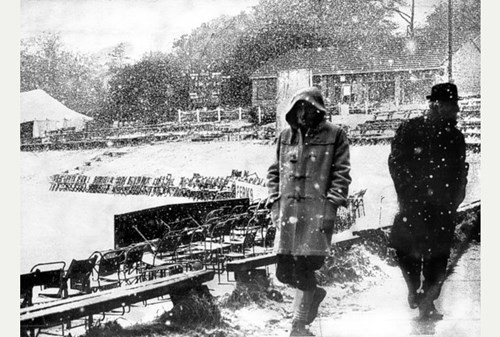Fifty year anniversary: When snow stopped play - Derbyshire v Lancashire at Buxton
Former Manchester Evening News cricket correspondent Colin Evans was present to witness an extraordinary match at Buxton fifty years ago
Jack Simmons was awake - just. Through a chink in the drawn curtains he saw blue sky. He stretched sleepily, glanced at his watch and wondered how much work lay ahead of him that day under a blazing sun. David Hughes, occupying the other bed in their hotel room, was thinking along similar lines.
It seemed inevitable that Simmons and Hughes had a heavy day in front of them, shouldering the lion's share of the bowling on the second day of the championship match against Derbyshire. It had been blistering hot on the first day, the pitch at The Park in Buxton was a batsman's dream and, if Derbyshire batted with any resilience, the Lancashire captain David Lloyd would inevitably turn to his two spinners to wheel away in temperatures which had recently hovered around the 75 degrees mark.
On the evidence of that little gap in the curtains Simmons guessed it would be another scorcher.
It was Monday June 2, 1975, and Lancashire had returned to Buxton, where the opening day's play had been marked by an astonishing innings from the West Indian star Clive Lloyd, before a 400-mile round trip down to Essex for a John Player League fixture on the Sunday.
Simmons had time to relax a little that morning. First a reviving cup of tea, brought to their room by the Spanish sounding waiter. What followed was like a scene from Fawlty Towers.
"Our room overlooked the main street," recalled Simmons. "Me and Yosser were still in bed and the curtains were drawn. I could see a bit of blue sky but when the waiter came in, I casually asked him what the weather was like. In broken English he said: ‘It snow’.
"We sent him packing and I got up and pulled the curtains right back and then of course that's when I saw it. Snow! The second of June. I said: 'Bloody hell Yosser he's right - it's been snowing."'
Hughes remembered: "I gave Simmo a few choice words. It was bad enough the waiter having us on, but Jack was taking it too far."
Simmons still shakes his head in disbelief: "Seeing snow on the ground was a shock but what followed was amazing."

The Buxton match of 1975 is enshrined as one of the most bizarre in the history of English cricket. 'No play – snow’ was the astonishing message sent out by the agency reporters in the Press Tent.
All that – and the snow – was still to come when David Lloyd called correctly at the toss on a swelteringly hot Saturday morning. Derbyshire were missing their two England pacemen Mike Hendrick and Alan Ward, and their plight had worsened by lunch with their seamers Keith Stevenson and Mick Glenn not only wicketless after 26 overs, but back in the dressing room with suspected food poisoning. Glenn ended up in hospital with a raging temperature and spent the following fortnight at home in bed.
From Lancashire's point of view, you could not get better batting conditions than on that red-hot Saturday afternoon as the threadbare Derbyshire bowling was torn apart. Barry Wood missed out and David Lloyd fell to the off cutters of Phil Russell but only after he and Frank Hayes had amassed 130 in two and a half hours. And that brought together the flashing blades of Hayes and Clive Lloyd.
Big Clive, captain of the West Indies and looking forward to the World Cup due to start the following weekend, was the planet's most destructive batsman. Over the next 167 remarkable minutes he hit 167 not out with eight sixes, most into the adjoining bowling green, and 15 fours.

Hayes's one six and 13 fours seemed almost tame by comparison, but his century was one of savage beauty, ended when he was caught off the occasional off spin of Ashley Harvey-Walker for 104, a non-descript finish to a wonderful exhibition of stroke-play.
Under the existing regulations Lancashire had to declare after 100 overs by which time they had amassed a huge total of 477 for five. To compound a miserable day, Derbyshire lost both openers, Alan Hill and Brian Bolus, to be 25 for two at stumps.
Lancashire’s players then set off for the long journey to Colchester where they suffered a 24-run defeat to Essex while Derbyshire had a happier time against Glamorgan at Buxton winning by 28 runs before the sides returned to The Park thinking they would be resuming their championship match.
My B and B was outside the town and on the Monday morning I looked out of the window and marvelled. As in the carol, the snow lay deep and crisp and even. Actually, the depth of snow varied from place to place and from witness to witness being measured at one inch, two inches and three inches. The umpire Dickie Bird topped the lot, estimating it at six inches! My memory is that you could pick up enough with one scoop of the hands to make a decent sized snowball. Whatever - up there in the hills it resembled a fairy tale Christmas card scene. Only this was early summer, June 2nd. Thick snow. Incredible. Impossible.
"Trees in full bloom with a white coating," was how one newspaper described it. Red tulips stuck through the snow like bloodstains. It was cold. Blackbirds searched desperately for food for their chicks.
Obviously, the match would be badly affected. Umpire Bird sent a message to the team hotel telling them there was little point in going to the ground at the usual time. Pitches were uncovered in those days, although the Buxton track now lay under a thick white carpet. The teams were told to await developments, but Lancashire decided to report to the ground and found themselves in a white-out.
"We drove through an unbelievable blizzard," said Peter Lever. "Visibility was down to 50 yards. Dickie Bird said: 'We'll not be playing here today! No-one disagreed.'"
A photographer persuaded a few of the Lancashire players to stage a snowball fight and the picture, along with one of two hunched up men, one in a Naval-type hooded duffle coat, another in an overcoat and trilby walking through the ground appeared in many newspapers the next day. Late Monday afternoon the sun re-appeared, and the pitch started to steam. “Like a sauna,” said Simmons.
On Tuesday morning the sun was out, and the match resumed on time. Lancashire took only 58 minutes to wrap up the first innings with Derbyshire shot out for 42, a mere 435 runs behind. Only two batsmen reached double figures, Lee doing most of the damage with 4-10 from 13.2 overs. He said: "The first over I bowled two or three balls came up throat high."
Simmons added: "Leapy (Lee) and Peter Lever were bowling and it was going straight past their heads - and there were no helmets in those days. It was outrageous really."
Batsmen had little body armour compared to today. Their best defence was technique and while they faced plenty of short-pitched stuff they adeptly kept their heads out of the way, ducking or leaning back to let the ball whistle through to the 'keeper. On this wicked strip Derbyshire's batsmen ducked, bent backwards and forwards, jumped, hopped and skipped out of the way. Playing a proper stroke was not really an option. Perhaps an optimistic waft or a heroic slog.
Dangerous or not the game went on. Lever sent down eight overs in the first innings and took only one wicket. Rumours persisted that he refused to bowl at his fastest. Lee claimed: "He wasn't keen to bowl."
It was easy to sympathize with Lever. Only a few months previously, while on tour with England, Lever had hit New Zealander Ewen Chatfield on the head. Chatfield collapsed, he swallowed his tongue, his heart stopped momentarily but he was resuscitated on the pitch by the England physio Bernard Thomas and taken to hospital. He suffered a hairline fracture of the skull but no permanent damage. As Thomas fought to save Chatfield's life Lever sank to the ground distraught. "I thought I had killed him," he said. "I bowled it too straight and he couldn't get out of the way. It was an experience that I would not care to repeat."

Whether that played on his mind at Buxton is unclear for in the second innings he earned 5-16 as Derbyshire surrendered again. However, there is no doubt that the pitch was dangerous. Even good length deliveries carried the threat of serious injury.
Lever explained: "The only way you could hit the stumps was to pitch it in the block-hole which showed why only one batsman was bowled in both innings." That batsman was Geoff Miller who, in the second knock, was bowled by Lever. Most batsmen edged behind or to the slips or dollied up catches to David Lloyd at short leg. One such was Harvey-Walker in that nightmarish first innings.
"He looked ashen faced when he arrived at the crease," said Lever. "He took a glove off, fumbled around in his mouth and extracted a set of false teeth. 'Here Dickie', he said to the umpire, 'can you look after these?' Bird was aghast. 'I'm not putting those in my pocket,' he said. After a bit of discussion he promised to take them provided they were wrapped up. Ashley pulled out a hankie and duly wrapped them up. David ‘Bumble’ Lloyd was fielding at bat-pad and said, 'Hang on a minute, if you're going to look after his you can look after mine' and he took out a set and handed them over.
Harvey-Walker told Bird that he would not have to act as the tooth fairy for too long and so it proved. He scratched out a few runs then turned his head away from one ball, it hit his glove and popped up to Bumble. "Did you catch it?" he asked. "Course I did," Lloyd replied. "Thank God for that," said Harvey-Walker and walked off, collecting his teeth on the way.
It is a much loved and recounted story, embellished by most who were there but it did happen, highlighting aspects of cricket which made it so different from other sports. Courage, sportsmanship, humour, camaraderie between opponents and officials. A game where 'professionalism' made its demands but not always at the expense of common humanity.
Alan Hill, Derbyshire's obdurate opener who been out for a duck on Saturday evening, made two in the second innings. "They were the bravest two runs I ever scored," he laughed years later. Alan Morris and Harvey-Walker both slogged their way to make 26 apiece as Derbyshire succumbed to 87 all out to lose an incredible game by an innings and 348 runs, still Lancashire’s third biggest victory by an innings.
Bird, who was to become cricket's most famous umpire, would never forget it. "A real experience - I have never seen anything like it in 50 years in cricket,” he said. “And it was a lovely place to be, a beautiful ground and great hospitality."
Snow fell in several parts of England that Monday, the first recorded in June since 1927. The game at Buxton wasn’t the only game affected with the Essex v Kent match - at Colchester ironically, where Lancashire had played less than 24 hours earlier – delayed by snow but they did get ten overs of play in later that day.
It was Buxton, and the unique images of the ground covered in snow during summer that day, that garnered all the headlines, becoming one of the most bizarre games in Lancashire’s history.
;
